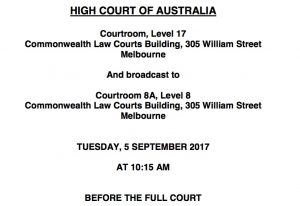The High Court has decided two proceedings challenging the legal basis for the Australian Marriage Law Postal Survey, dismissing the first application and answering questions stated in the special case in the second proceeding, holding that the Minister’s determination to fund the Survey was not invalid, and was validly authorised under the most recent appropriations act.
Following the Government’s 7 August 2017 announcement of a ‘voluntary postal plebiscite’ on whether Australian law should be changed to allow same-sex couples to marry, to be run by the Australian Bureau of Statistics, the Finance Minister (and respondent in the second matter) made a determination entitled ‘Advance to the Finance Minister Determination (No 1 of 2017–2018)’ to provide the ABS with $122 million for the plebiscite. That determination was purportedly supported by s 10 of the Appropriation Act (No 1) 2017–2018, which allows the Finance Minister to make a determination to provide for expenditures not exceeding $295 million where the Finance Minister ‘is satisfied that there is an urgent need for expenditure, in the current year, that is not provided for … in Schedule 1 … because the expenditure was unforeseen until after the last on which it was practicable to provide for it [in the original Bill]’. The Finance Minister stated in the instrument and in an affidavit that because the 2017–18 budget was tabled in May 2017, and Government policy on holding the plebiscite and using the ABS to do so was not changed until August, he was satisfied that there was an urgent need for the expenditure (see further at [32]–[37]). Continue reading
